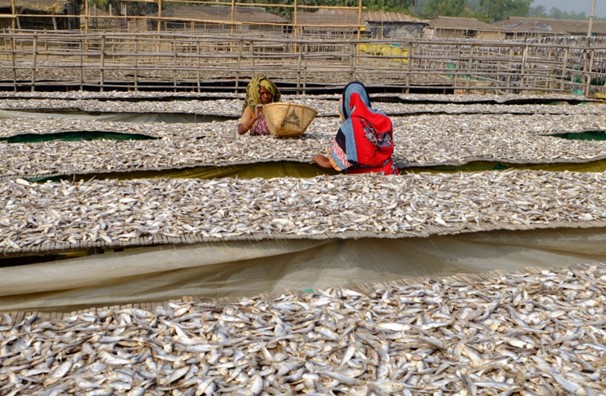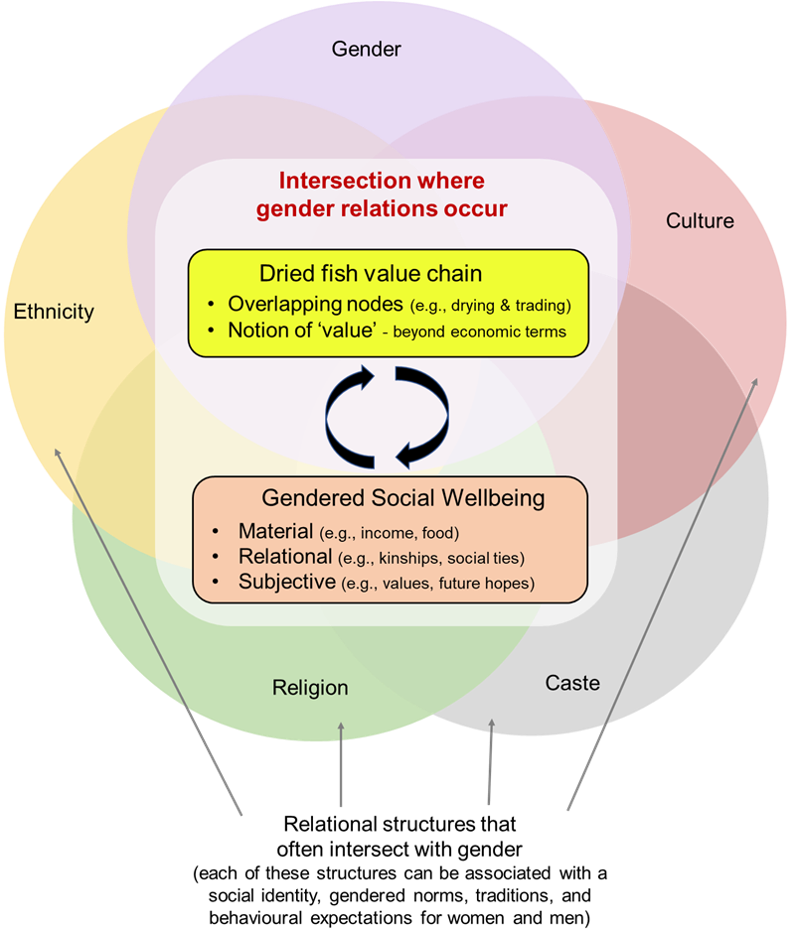Dried fish is considered a ‘hidden’ sub-sector within small-scale fisheries, and is particularly important in Asia and Africa. Women make up a significant portion of the workforce in this sub-sector. For example, over 50% of the casual workforce in fish drying yards in Bangladesh are women (Belton et al. 2018). Dried fish production and consumption is organized as a chain of activities from fish harvesting to drying/processing, trading, and distribution referred to as a value chain (Hossain, 2015). Through their employment in value chain activities, women generate significant benefits that support the survival and wellbeing of themselves, their families, and communities (Belton et al. 2018).
Women in dried fish value chains, however, face constraints that severely restrict their ability to fully participate in and benefit from their activities compared to men. For example, access to raw fish is shaped by the gender relations embodied in value chains as women sometimes are only allowed to purchase inferior quality raw fish (Manyungwa et al. 2019). Moreover, gendered norms of access to spaces such as dock-side auctions and fish markets impact their ability to sell dried products (Matsue et al., 2014). In particular, the women from marginalized societal groups such as the lower castes, widows, and refugees bear the brunt of these inequalities (Belton et al. 2018).

Photo credit: https://driedfishmatters.org)
Gender relations broadly refer to the interactions among gender groups and how individuals navigate systems of power that shape norms of behavior and expectations associated with gender identities (Biswas, 2018). Gender relations are highly dynamic as they are constantly being negotiated and constructed within given contexts (Bennett, 2005). If so, how can we unpack the complexity within dried fish value chain contexts in a way that we develop a ‘thick description’ of gender relations? Here, the term thick description refers to in-depth analyses that pay special attention to contextual details and social meanings that individuals ascribe to their own experiences.
Value chain research offers a variety of approaches informed by diverse notions such as gender equality, human rights, and inclusive development to examine gender perspectives. Although these approaches have brought substantial attention towards gender inequity issues in value chains, they pay less/no attention to the diverse benefits supported by value chains or the context-specific factors that shape such benefits. In other words, we need novel approaches that help us develop more contextualized understandings of the unique positions of women and men in value chains.
This is precisely why we developed an integrated framework to study gender relations within dried fish value chains (please see recent publication). Our new framework links the concepts of social wellbeing and intersectionality with gendered value chain analysis. In doing so, the overarching focus is on the notion of relationality, i.e., the creation of experiences in relation to one another within a given context.
The social wellbeing concept helps bring attention to the range of benefits that are important to women and men (McGregor, 2008). In relation to dried fish value chains, material goods (e.g., wages, food) as well as the relational and subjective benefits (e.g., kinship ties, sense of connectedness, mutual trust, cultural traditions, future hopes) have values and meanings that extend beyond mere financial terms. Intersectionality, on the other hand, helps explore how structures of power and oppression (e.g., gender, ethnicity, religion, and caste) overlap within value chains and shape people’s real-world experiences (Crenshaw, 1989; 1991). In Nazirartek, Bangladesh, for example, women workers in drying yards include local inhabitant groups, migratory workers from elsewhere in Bangladesh, and Rohingya refugees from Myanmar (Belton et al. 2018). About one third of Rohingya women workers are widowed, abandoned, or divorced (Belton et al. 2018). These workers face wide-spread ill-treatment, discrimination, and exclusion that arise when gender intersects with other structures of oppression, including racism (Rohingya vs. Bengali ethnic origins), localism (local inhabitants vs. migratory workers), and marital status (widowed, abandoned, or divorced women).

Since the unique array of structures operating within a given value chain is shaped by the context it is embedded in, the framework can be modified to exclude or include other structures (e.g., marital status, age, or sexuality). A two-way linkage exists between the value chain and social wellbeing as improved wellbeing leads to better value chain outcomes. For example, mutual trust and information sharing mediated through social ties may provide women with access to good quality fish and profitable markets. Despite the hardships, women continue to engage in dried fish activities for a range of potential benefits. For example, women traders on the Tanzanian shores of Lake Victoria, East Africa, continue trading to improve their living conditions, educate children, and gain economic independence, although there is competition amongst them based on their Tanzanian and Congolese ethnic origins (Medard et al., 2019).
Application of the new framework may reveal a thick description of gender relations that includes contextually nuanced insights on women’s and men’s differential positions, wellbeing outcomes, underlying forms of discrimination, and the root causes of inequities in value chains. Such insights (e.g., who has access to resources to begin with) may help identify entry points for policy and program interventions towards fostering gender equitable outcomes for everyone. Furthermore, those insights can guide the development of targeted regulatory measures to enable the achievement of gender equality commitments within current policy frameworks such as the FAO’s Voluntary Guidelines for Securing Sustainable Small-scale Fisheries (SSF Guidelines).
References:
Belton, B., M.A.R. Hossain, and S.H. Thilsted. 2018. Labour, Identity and Wellbeing in Bangladesh’s Dried Fish Value Chains. In Social Wellbeing and the Values of Small-Scale Fisheries, 217–241. Cham: Springer International Publishing.
Bennett, E. 2005. Gender, fisheries and development. Marine Policy 29: 451–459.
Biswas, N., 2017. Towards gender-equitable small-scale fisheries governance and development: A handbook in support of the implementation of the Voluntary Guidelines for Securing Sustainable Small-Scale Fisheries in the Context of Food Security and Poverty Eradication. Rome: Food and Agriculture Organization of the United Nations.
Crenshaw, K. 1991. Mapping the margins: Intersectionality, identity politics, and violence against women of color. Stanford Law Review 43: 1241–1299.
Crenshaw, K. 1989. Demarginalizing the Intersection of Race and Sex: a Black Feminist Critique of Antidiscrimination Doctrine, Feminist Theory and Antiracist Politics. University of Chicago Legal Forum 1 (Article 8).
Hossain, M.A.R., B. Belton, and S.H. Thilsted. 2015. Dried fish value chain in Bangladesh. Dhaka: WorldFish, Bangladesh and South Asia Office.
Manyungwa, C.L., M.M. Hara, and S.K. Chimatiro. 2019. Women’s engagement in and outcomes from small-scale fisheries value chains in Malawi: Effects of social relations. Maritime Studies 8: 1–11.
McGregor, A. 2008. Well-Being, Poverty and Conflict. Briefing Paper 1/08, ESRC Research Group on Wellbeing in Developing Countries. Bath: University of Bath.
Matsue, N., T. Daw, and L. Garrett. 2014. Women Fish Traders on the Kenyan Coast: Livelihoods, Bargaining Power, and Participation in Management. Coastal Management 42: 531–554.
Medard, M., H. van Dijk, and P. Hebinck. 2019. Competing for kayabo: Gendered struggles for fish and livelihood on the shore of Lake Victoria. Maritime Studies 18: 321–333.
* Madu Galappaththi is a PhD Candidate at the School of Environment, Resources and Sustainability, University of Waterloo, Canada. Her doctoral research is focused on governance opportunities to foster gendered social wellbeing in dried fish value chains with geographic focus on Sri Lanka. Madu’s research is part of an ongoing Canadian-based Research Partnership titled ‘Dried Fish Matters’, which focuses on dried fish social economies of South and South East Asia.
This entry was posted in: Bangladesh, Concepts, Theory, Fisheries, Gender, Global, Men, Tanzania, Value Chains, Women
